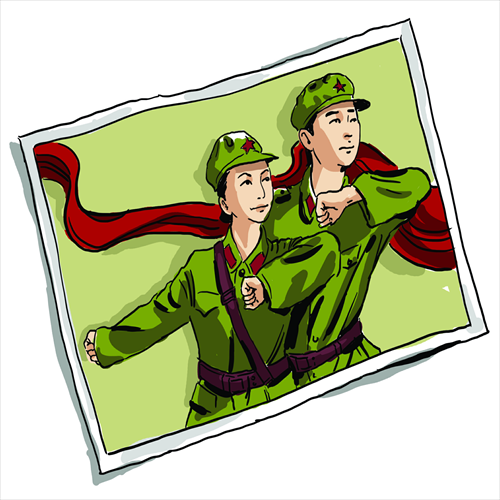West’s Mao obsession long irrelevant

Illustration: Liu Rui/GT
When my cousin, born after 1980, got married a few years ago, she chose her wedding photo album a combination of veiled wedding gown, cheongsam, and military uniform.
Neither she and her husband are soldiers, the uniform offered is actually the style of decades ago. It is themed around being a "revolutionary couple," a photo idea my cousin thought was fun and picked from among other options of "classic" and "romantic."
The outfit was popular in the time of the Cultural Revolution (1966-76). Today it represents more commercial creativity than political connotations. The bad taste it might leave in the mouth for those who suffered during that era doesn't even occur to young people who see it purely as a fashion choice.
Last month, a report by the UK Guardian revealed that the Little Red Book, a collection of Chairman Mao's quotations, would be reprinted soon. The news caused some stir among China watchers. For some, it may be a sign that China is turning left. The news was later denied by the Xinhua News Agency.
No matter its authenticity, its significance is overblown as the Guardian report was barely noticed by domestic public opinion. As a matter of fact, Mao's works, such as The Selected Works of Mao Zedong and Poetry of Mao Zedong, are in constant supply in mainland bookstores. His essays have appeared in textbooks for generations.
Opinions over Mao, his legacy and the era he shaped have become diversified in China. In the academic world, there are increasing discussions of the effects of his regime. Calls for further reflection over the devastation of the Cultural Revolution are on the rise.
Loyal followers as well as staunch opponents may engage in emotional clashes of viewpoints, while the average Chinese has accepted Mao as a complicated figure.
Debate is still going on as to how to define Mao's merits and mistakes, but for a whole nation to be recaptured by his ideology is unimaginable. The important lesson drawn from the Cultural Revolution is that pragmatism, not ideological dogma, is key to a country's development.
The catastrophe inflicted by Cultural Revolution is a somber enough reminder of how blind faith in ideology can wreck a country, be it from left or right.
Everything about Mao was deified in the past. Now, many of the elements of that time have been commercialized.
In fact, the Little Red Book is commonly seen in souvenir store. Mao's famous quotes are printed on mugs. His celebrity doubles can even be invited to appear in private or public events for lucrative fee. The champion of communism has become commoditized.
But Westerners still persistently see China with a tint of Mao. Everything about Mao is scrutinized for signs that may give them hint for a future China, most often rather polarizing, either a radically conservative state or one that fully embraces the Western values.
A Western friend once told me that books about China with a title containing Mao are more eye-catching than those without. The Mao mania has subsided among the public, but it seems the West, when it comes to interpreting China, is still obsessed with fantasies of Mao.
To be sure, Mao's legacy will continue to be felt in China. The diversification of public opinion in China brings alive the debate of Mao, with some rather extreme views. But neither deified worship nor complete denial represents the attitude of mainstream society.
Debate over Mao is also a result of split values between the "left" and "right" in Chinese society. Though it makes a big noise online sometimes, it could hardly challenge the mainstream of pragmatism.
Nowadays, one "little red book" is indeed enthusiastically pursued and read by Chinese young people. But not Mao's. College students, chasing their dreams in the path of further education and career, refer to the most effective reference books as the "little red book." At least, the title helps sales.
The author is a commentator with the Global Times. opinion@globaltimes.com.cn